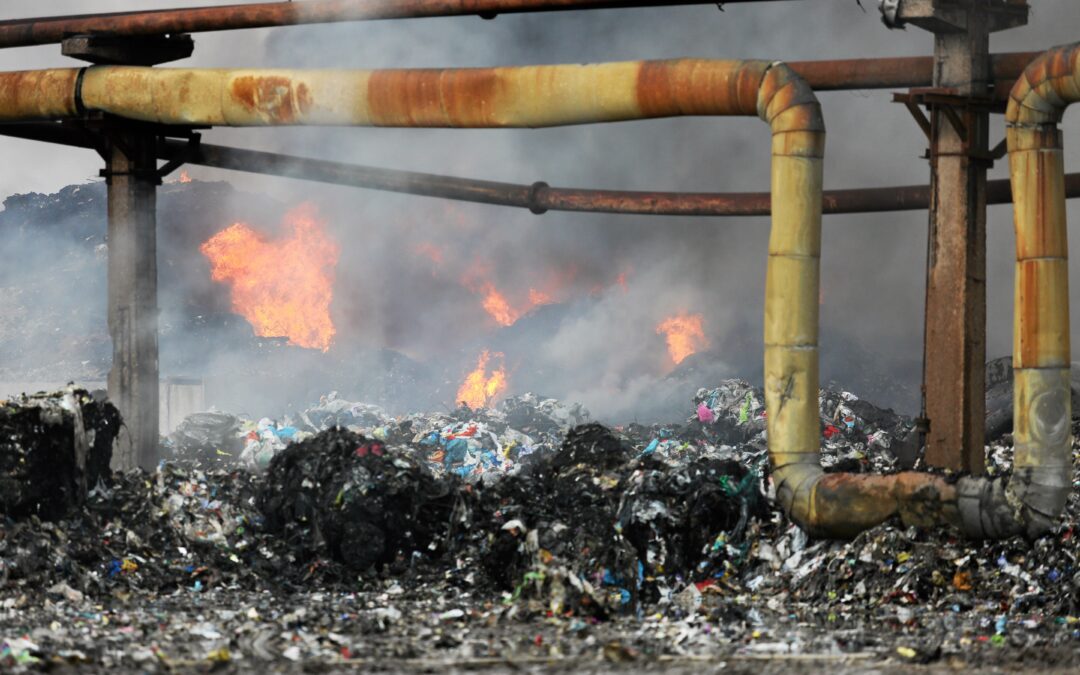A new department is being created by Poland’s environmental protection inspectorate in the latest attempt to tackle the so-called “trash mafia” – organised groups that illegally dispose of waste, which has often been sent for processing from other countries.
Imports of foreign waste increased dramatically after 2015, and came to wider public attention in 2018 when a series of fires broke out at sites storing some of the rubbish.
Although mechanisms to oversee waste processing and to punish violators have been toughened in recent years, the authorities believe that more needs to be done. Illegal dumping practices have also become easier due to measures introduced during the coronavirus pandemic.
Poland has become the rubbish dump of Europe, receiving 730k tonnes last year, twice as much as in 2015. Waste comes from as far away as Australia. Many illegal dumps have caught fire recently in what are believed to be deliberate attempts to avoid properly disposing of the trash pic.twitter.com/Ru6y5bdNKY
— Notes from Poland 🇵🇱 (@notesfrompoland) June 1, 2018
Local authorities are are often lured by low costs for waste management offered by private companies that then dump the rubbish in forests or other illegal locations, says deputy climate minister Jacek Ozdoba. Another issue is toxic waste, which often ends up in abandoned warehouses or on land leased by bogus companies.
The new unit will include former police officers, whose “professional experience and skills will help the inspectorate to make the best use of the knowledge gained so far”, says the climate ministry.
They will have a number of modern tools at their disposal, such as satellite surveillance and special drones, as well as the right to perform checks on any vehicle moving waste around the country. They will also have access to an electronic database registering all waste management.
“One of the tasks of the new department will be coordinating the work of various services – the environmental inspectorate, prosecutor’s office, police, the national revenue administration and road inspectorate – all to fight the trash mafia”, says Ozdoba, quoted by Interia.
“This sector [of waste management] has a very bad reputation,” continued Ozdoba. “Unfortunately it provides a lot of opportunities for dishonest business.”
Poland has been hit by a plague of fires at rubbish dumps in the last couple of weeks, many containing waste sent from western Europe for recycling or disposal. It's suspected some fires were started deliberately, as a cheap way to get rid of the rubbish https://t.co/6NjW75oAWZ pic.twitter.com/2q54N9lFL7
— Notes from Poland 🇵🇱 (@notesfrompoland) May 29, 2018
New measures were previously introduced in 2018, following outrage at dozens of fires at waste storage facilities around Poland. As well as tougher punishments, a new electronic database was introduced to register the almost 177,000 entities dealing with waste management.
Meanwhile, the number of inspections increased dramatically, from 55 in 2018 to 628 last year, reports Dziennik Gazeta Prawna. As a result, twice as many cases of illegal activity were discovered in 2019 than the previous year.
In one case last year, six men were given prison sentences ranging up to four years for running firms that illegally stored toxic waste in Kujawy-Pomerania Province, reported Nasze Miasto.
In May this year, prosecutors brought charges against 41 people in Małopolska Province who are accused of illegally disposing of over 55,000 tonnes of hazardous waste in less than two years, for which they earned 23 million zloty (€5.2 million), reports TVP.
However, the import of foreign waste has remained at high levels, reaching 405,000 tonnes last year, up from 154,000 tonnes in 2015, according to official figures. The largest quantities come from Germany, Sweden, the UK, Italy and Austria. Some has arrived from as far afield as Australia and Nigeria.
In February this year, Polish police announced that 220 tonnes of waste illegally brought to Poland would be returned to the UK, at the cost of the British authorities.
⭐️Bum! Wpłynęła odp. GIOŚ ws. zalewania Polski śmieciami.
W 2019 to aż 405 tys. ton śmieci🤦♂️
W 4 lata -> 1,5 miliona ton śmieci z zagranicy.
2017-2019 2krotny wzrost procentowego udziału śmieci z Niemiec😱 #PrzejścioweCeny #PrzejściowyimportŚmieci #Realia #Interwencje pic.twitter.com/ANSm2LvNRj— Krzysztof Brejza – Biuro Senatorskie (@KrzysztofBrejza) February 22, 2020
However, measures introduced in response to the coronavirus pandemic have seen some of the progress undone, writes Rzeczpospolita. The most controversial move was the suspension of the electronic system for monitoring waste movement in real time.
This allowed the criminal groups to operate more boldly again, suggests the newspaper. There have already been 58 fires at storage sites reported this year. In some cases the same sites were burned repeatedly.
According to estimates, the Polish “trash mafia” is responsible for up to 2.5 billion zloty (€0.6 million) of losses from the state budget due to the unpaid taxes, reports Dziennik Gazeta Prawna. The health and environmental damage caused by illegal practices is also significant, though harder to quantify.
As well as the air pollution caused by burning waste, containers used to store dangerous substances can leak, says Michał Paca an expert in waste management.
“This can happen even years after dumping and we will only find out when we discover local water pollution,” he tells Dziennik Gazeta Prawna.
Main image credit: Marcin Wojciechowski / Agencja Gazeta

Agnieszka Wądołowska is deputy editor-in-chief of Notes from Poland. She is a member of the European Press Prize’s preparatory committee. She was 2022 Fellow at the Entrepreneurial Journalism Creators Program at City University of New York. In 2024, she graduated from the Advanced Leadership Programme for Top Talents at the Center for Leadership. She has previously contributed to Gazeta Wyborcza, Wysokie Obcasy and Duży Format.




















